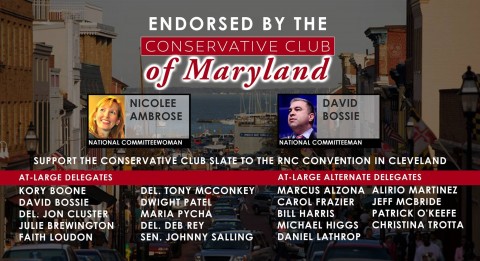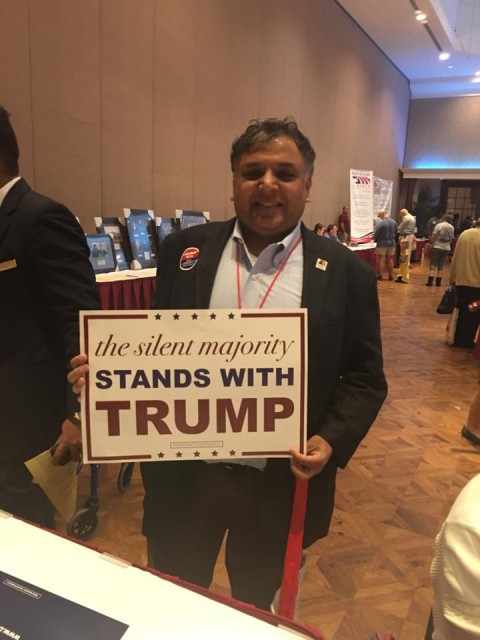Let’s start off with my initial emotions on this announcement: disappointment, then resignation. I think this adequately captures both sides of the equation going forward, so allow me to elaborate.
I consider myself a limited-government conservative, or perhaps better described as a conservative with libertarian tendencies in a number of respects and areas. I often write about the idea of “rightsizing” the federal government down to a point where it does the minimum required of it in the Constitution, and this worldview affected my perception of the 2016 Presidential field. Ted Cruz was not my overall first choice out of the group, but of those remaining when Maryland’s day in the sun came back in late April he was – by miles – the best remaining choice in terms of my stated desire to reform the federal government in a Constitutional manner.
On the other hand, I had already heard and seen enough from Donald Trump to know that he wasn’t going to significantly improve the situation inside the Beltway. He had already backtracked and capitulated on enough campaign issues for me to see that he wasn’t going to be trustworthy enough to be the GOP standard-bearer. Although we went for a period of about 2 1/2 months before the Republican National Convention with the idea that there still were chances to derail the Trump train, the national Republican party (and Trump zealots) did their best to make sure that the “victory” Trump won (dubious at best, thanks to the number of open primaries) with just a plurality of the Republican vote would stand. In the end, many supporters of Ted Cruz as well as John Kasich were browbeaten into acceptance – the rest became the significant number of #NeverTrump folks out there, of which I was one. I would not accept Trump as the nominee, and my conscience would not allow me to work within an organization that promoted someone of dubious value to the conservative movement.
So when Ted Cruz stood at the podium of the convention and exhorted everyone to vote their conscience, I considered it a highlight of an otherwise pathetic coronation of The Donald as Republican nominee. My confidence in Trump upholding the planks of the GOP platform was about the same as the confidence that he could go a week without being on the media for saying something asinine – in both cases, about zero. The fact that the Trump people booed Ted Cruz off the stage was proof that they weren’t principled enough to stand before conservatives to defend their candidate when his bona fides were questioned.
Obviously I was not thrilled to see Cruz fall off the #NeverTrump wagon after all that transpired between Trump and “lyin’ Ted” during the primaries. (Of course, that assumes he was really ever on it.) But as Christians we pray to have our trespasses forgiven as we would those who trespass against us, and from the tenor of Cruz’s comments in his statement I think he has forgiven Donald Trump for what he said during the campaign as simple competitive rhetoric.
And Cruz has a number of political calculations he has to account for, too. After November the election season turns to the 2018 cycle, and Cruz is part of it as the junior Senator from Texas. Certainly there are already people in Texas politics smarting from the very fact that Cruz upset the establishment choice of former Lt. Gov. David Dewhurst in the GOP primary there four years ago, but former Gov. Rick Perry is one of those rumored to be considering a 2018 run for Cruz’s seat. Opponents cite the alienation of Trump voters as just another factor against Cruz, since there’s also the perceived blame for the 2013 government slowdown and the reputation for being a boat-rocking troublemaker that Cruz carries. (It should be noted that all that baggage was supposed to sink Cruz’s presidential campaign early on, but he outlasted most of the rest of the field that was supposedly more palatable to the electorate.)
For all his issues, it’s clear that for Ted Cruz to have a political future he had to modify his stance on Trump, and that was made more convenient by the unqualified Democratic candidate and the pledge he took to support the Republican. Over the next four years he is more useful in the Senate than martyred by his own rhetoric.
So let’s say Trump loses, Cruz retains his Senate seat, and the Clinton/Kaine team continues the damage done by Obama/Biden. The question is whether people will be as passionate about Cruz in 2020 or if they will consider him damaged goods? Assuming Trump loses and doesn’t wish to try again at the age of 73, the early favorite in 2020 has to be Mike Pence – just as the first rights of refusal went to Sarah Palin in 2012 and Paul Ryan this year. But there will certainly be a crop of those who didn’t grasp the brass ring this year looking to seize the nomination: I would strongly suspect that group includes Cruz, John Kasich, Marco Rubio, Rand Paul, Scott Walker, and Bobby Jindal. All of them (except Kasich, who briefly ran in 2000) were first-time candidates – the political world seems to be that of just two strikes and being out, which eliminates guys like Rick Santorum and Mike Huckabee as old news. All but Kasich also seek the votes of strong conservatives, with Kasich being more of a moderate.
At this point I would still like to see Bobby Jindal make a 2020 run, as there’s little chance one of the 2016 crop knocks him off as the king of my hill. But someone new could strike my fancy or there could be a significant moderation in Jindal’s political views. Still, I would welcome Ted Cruz to the fray with open arms, knowing he had to do those things he may not have liked in order to keep his position of leadership in the conservative movement.
As for me, I remain #NeverTrump whether it’s politically damaging or not. Since politics is not my job I have little to lose but a lot to gain as I work to convince people of the benefits of limited government and support those inside politics who advocate it with actions, not words.



